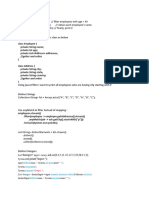0 ratings0% found this document useful (0 votes)
10 viewsImplementation of Java Program To Demonstrate File Handling and Object Serialization
Uploaded by
harsitaCopyright
© © All Rights Reserved
Available Formats
Download as PDF, TXT or read online on Scribd
0 ratings0% found this document useful (0 votes)
10 viewsImplementation of Java Program To Demonstrate File Handling and Object Serialization
Uploaded by
harsitaCopyright
© © All Rights Reserved
Available Formats
Download as PDF, TXT or read online on Scribd
You are on page 1/ 8
IMPLEMENTATION OF JAVA PROGRAM TO DEMONSTRATE FILE
HANDLING AND OBJECT SERIALIZATION
PROGRAM CODE:
import java.io.*;
class Salary implements Serializable {
private static final long serialVersionUID = 1L;
double m_salary;
double other;
Salary(double m, double o) {
this.m_salary = m;
this.other = o;
}
double totalsalary() {
return m_salary + other;
}
public String toString() {
return "Salary [Base Salary: " + m_salary + ", Other: " + other + ", Total: " +
totalsalary() + "]";
}
}
class Wages implements Serializable {
private static final long serialVersionUID = 1L;
double home_wages;
double repair_charges;
double medicinal_wages;
Wages(double wages, double charges, double medicine) {
this.home_wages = wages;
this.repair_charges = charges;
this.medicinal_wages = medicine;
}
double totalwages() {
return home_wages + repair_charges + medicinal_wages;
}
public String toString() {
return "Wages [Home: " + home_wages + ", Repair: " + repair_charges + ",
Medical: " + medicinal_wages +
", Total: " + totalwages() + "]";
}
}
class Savings implements Serializable {
private static final long serialVersionUID = 1L;
double tsalary;
double twages;
Savings(double sala, double wage) {
this.tsalary = sala;
this.twages = wage;
}
double savingsEarned() {
return tsalary - twages;
}
public String toString() {
return "Savings [Total Salary: " + tsalary + ", Total Wages: " + twages + ",
Savings: " + savingsEarned() + "]";
}
}
public class Exp8 {
public static void main(String[] args) {
try {
Salary sal = new Salary(32000, 5000);
Wages wag = new Wages(20000, 3000, 5000);
Savings sav = new Savings(sal.totalsalary(), wag.totalwages());
FileOutputStream fileOut = new FileOutputStream("data.ser");
ObjectOutputStream out = new ObjectOutputStream(fileOut);
out.writeObject(sal);
out.writeObject(wag);
out.writeObject(sav);
out.close();
fileOut.close();
System.out.println("Data has been serialized to 'data.ser'");
FileInputStream fileIn = new FileInputStream("data.ser");
ObjectInputStream in = new ObjectInputStream(fileIn);
Salary deserializedSal = (Salary) in.readObject();
Wages deserializedWag = (Wages) in.readObject();
Savings deserializedSav = (Savings) in.readObject();
in.close();
fileIn.close();
System.out.println("\nDeserialized Data:");
System.out.println(deserializedSal);
System.out.println(deserializedWag);
System.out.println(deserializedSav);
} catch (IOException | ClassNotFoundException e) {
e.printStackTrace();
}
}
}
OUTPUT:
IMPLEMENTATION OF JAVA PROGRAM TO DEMONSTRATE
MANIPULATIONS OF DATA USING COLLECTIONS
PROGRAM CODE:
import java.util.*;
class Salary {
double m_salary;
double other;
Salary(double m, double o) {
this.m_salary = m;
this.other = o;
}
double totalsalary() {
return m_salary + other;
}
public String toString() {
return "Salary [Base: " + m_salary + ", Other: " + other + ", Total: " +
totalsalary() + "]";
}
}
class Wages {
double home_wages;
double repair_charges;
double medicinal_wages;
Wages(double wages, double charges, double medicine) {
this.home_wages = wages;
this.repair_charges = charges;
this.medicinal_wages = medicine;
}
double totalwages() {
return home_wages + repair_charges + medicinal_wages;
}
public String toString() {
return "Wages [Home: " + home_wages + ", Repair: " + repair_charges + ",
Medical: " + medicinal_wages +
", Total: " + totalwages() + "]";
}
}
class Savings {
double tsalary;
double twages;
Savings(double sala, double wage) {
this.tsalary = sala;
this.twages = wage;
}
double savings_earned() {
return tsalary - twages;
}
public String toString() {
return "Savings [Total Salary: " + tsalary + ", Total Wages: " + twages + ",
Savings: " + savings_earned() + "]";
}
}
public class Exp9 {
public static void main(String[] args) {
List<Salary> salaries = new ArrayList<>();
salaries.add(new Salary(32000, 5000));
salaries.add(new Salary(35000, 7000));
List<Wages> wages = new LinkedList<>();
wages.add(new Wages(20000, 3000, 5000));
wages.add(new Wages(15000, 2000, 3000));
Set<Double> uniqueSalaries = new HashSet<>();
for (Salary sal : salaries) {
uniqueSalaries.add(sal.totalsalary());
}
Set<Double> sortedSavings = new TreeSet<>();
for (int i = 0; i < salaries.size() && i < wages.size(); i++) {
double totalSalary = salaries.get(i).totalsalary();
double totalWages = wages.get(i).totalwages();
sortedSavings.add(new Savings(totalSalary, totalWages).savings_earned());
}
Map<Salary, Wages> salaryToWages = new HashMap<>();
for (int i = 0; i < salaries.size() && i < wages.size(); i++) {
salaryToWages.put(salaries.get(i), wages.get(i));
}
System.out.println("ArrayList (Salaries):");
salaries.forEach(System.out::println);
System.out.println("\nLinkedList (Wages):");
wages.forEach(System.out::println);
System.out.println("\nHashSet (Unique Salaries):");
uniqueSalaries.forEach(System.out::println);
System.out.println("\nTreeSet (Sorted Savings):");
sortedSavings.forEach(System.out::println);
System.out.println("\nHashMap (Salary to Wages Mapping):");
salaryToWages.forEach((key, value) ->
System.out.println("Salary: " + key + " -> Wages: " + value));
}
}
OUTPUT:
You might also like
- Implementation of Java Program To Demonstrate Method Overloading and Constructor OverloadingNo ratings yetImplementation of Java Program To Demonstrate Method Overloading and Constructor Overloading8 pages
- Implementation of Java Program To Pass Arguments To A Method and Return ValueNo ratings yetImplementation of Java Program To Pass Arguments To A Method and Return Value8 pages
- Implementation of Java Program To Demonstrate Aggregation and CompositionNo ratings yetImplementation of Java Program To Demonstrate Aggregation and Composition4 pages
- Implementation of Java Program To Demonstrate Exception HandlingNo ratings yetImplementation of Java Program To Demonstrate Exception Handling6 pages
- Homework #1: Please Refer To The Code in The Appendix (Pages 2 - 6) To Answer The Following QuestionsNo ratings yetHomework #1: Please Refer To The Code in The Appendix (Pages 2 - 6) To Answer The Following Questions5 pages
- Java Project Report On Employee Management System100% (1)Java Project Report On Employee Management System16 pages
- Oop Assignment 01: Name: Ghazanfar Qarshi ROLL NO: 2020-BSCS-019 Sec: ANo ratings yetOop Assignment 01: Name: Ghazanfar Qarshi ROLL NO: 2020-BSCS-019 Sec: A9 pages
- Rules/naming Convention's We Need To Follow While Writing The ProgramNo ratings yetRules/naming Convention's We Need To Follow While Writing The Program4 pages
- 11 Task Performance in Integrative ProgrammingNo ratings yet11 Task Performance in Integrative Programming10 pages
- Chapter-Seven: Object-Oriented ImplementationNo ratings yetChapter-Seven: Object-Oriented Implementation23 pages
- Setting Up CloudFront To Host Your Web App - CSS-Tricks - CSS-TricksNo ratings yetSetting Up CloudFront To Host Your Web App - CSS-Tricks - CSS-Tricks23 pages
- Wattmonmini3: Remote Monitoring & Control SolutionNo ratings yetWattmonmini3: Remote Monitoring & Control Solution2 pages
- Red Hat Enterprise Linux-7-7.3 Release Notes-En-USNo ratings yetRed Hat Enterprise Linux-7-7.3 Release Notes-En-US232 pages
- The Ackermann Principle As Applied To SteeringNo ratings yetThe Ackermann Principle As Applied To Steering7 pages
- Examinerreport Unit1 (WDM11) October2020No ratings yetExaminerreport Unit1 (WDM11) October20209 pages
- Scribd For Entrepreneurs: A Blueprint For Business SuccessNo ratings yetScribd For Entrepreneurs: A Blueprint For Business Success2 pages
- CCPS - Managing Cybersecurity in The Process IndustriesNo ratings yetCCPS - Managing Cybersecurity in The Process Industries476 pages
- Nstruction Manua: Model Year: Model Name: PurposeNo ratings yetNstruction Manua: Model Year: Model Name: Purpose15 pages
- Reasoning with Data An Introduction to Traditional and Bayesian Statistics Using R 1st Edition Jeffrey M. Stanton - Download the ebook now and own the full detailed content100% (3)Reasoning with Data An Introduction to Traditional and Bayesian Statistics Using R 1st Edition Jeffrey M. Stanton - Download the ebook now and own the full detailed content56 pages
- D Andrea Tools Heads 2017 GB Ru PL CZ TRNo ratings yetD Andrea Tools Heads 2017 GB Ru PL CZ TR306 pages
- Implementation of Java Program To Demonstrate Method Overloading and Constructor OverloadingImplementation of Java Program To Demonstrate Method Overloading and Constructor Overloading
- Implementation of Java Program To Pass Arguments To A Method and Return ValueImplementation of Java Program To Pass Arguments To A Method and Return Value
- Implementation of Java Program To Demonstrate Aggregation and CompositionImplementation of Java Program To Demonstrate Aggregation and Composition
- Implementation of Java Program To Demonstrate Exception HandlingImplementation of Java Program To Demonstrate Exception Handling
- Homework #1: Please Refer To The Code in The Appendix (Pages 2 - 6) To Answer The Following QuestionsHomework #1: Please Refer To The Code in The Appendix (Pages 2 - 6) To Answer The Following Questions
- Oop Assignment 01: Name: Ghazanfar Qarshi ROLL NO: 2020-BSCS-019 Sec: AOop Assignment 01: Name: Ghazanfar Qarshi ROLL NO: 2020-BSCS-019 Sec: A
- Rules/naming Convention's We Need To Follow While Writing The ProgramRules/naming Convention's We Need To Follow While Writing The Program
- Setting Up CloudFront To Host Your Web App - CSS-Tricks - CSS-TricksSetting Up CloudFront To Host Your Web App - CSS-Tricks - CSS-Tricks
- Wattmonmini3: Remote Monitoring & Control SolutionWattmonmini3: Remote Monitoring & Control Solution
- Red Hat Enterprise Linux-7-7.3 Release Notes-En-USRed Hat Enterprise Linux-7-7.3 Release Notes-En-US
- Scribd For Entrepreneurs: A Blueprint For Business SuccessScribd For Entrepreneurs: A Blueprint For Business Success
- CCPS - Managing Cybersecurity in The Process IndustriesCCPS - Managing Cybersecurity in The Process Industries
- Reasoning with Data An Introduction to Traditional and Bayesian Statistics Using R 1st Edition Jeffrey M. Stanton - Download the ebook now and own the full detailed contentReasoning with Data An Introduction to Traditional and Bayesian Statistics Using R 1st Edition Jeffrey M. Stanton - Download the ebook now and own the full detailed content

























































































